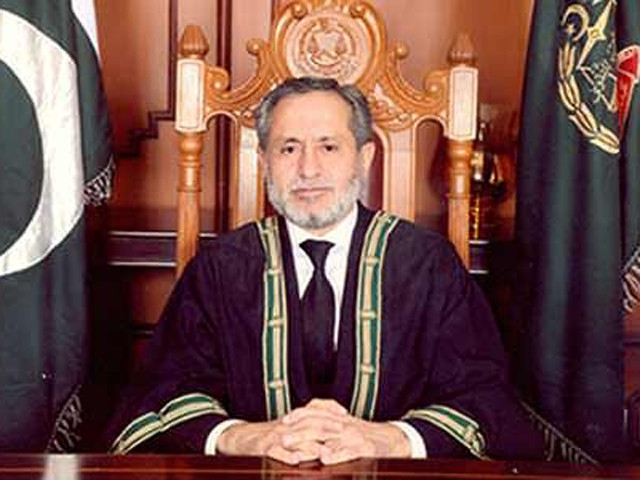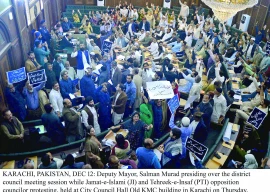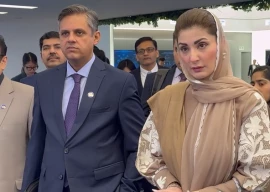
Supreme Court judge Jamal Khan Mandokhail has raised questions about the trial of civilians in military courts, noting that a person not bound by military discipline can also not be tried by a military court formed under the Pakistan Army Act, 1952.
"A person who is not subject to the [Pakistan] Army Act cannot be deprived of his fundamental rights. Article 8 of the Constitution mentions army laws in the context of their discipline," he said on Thursday.
Justice Mandokhail was part of a seven-member Constitutional Bench (CB) of the Supreme Court hearing the government's appeal against the October 2023 order of an apex court bench in a military trial case.
On October 23, 2023, a five-member bench of the Supreme Court unanimously declared the trial of civilians in military courts null and void and ordered that the 103 accused in cases related to the violence on May 9 and 10, 2023 be tried under the ordinary criminal laws.
The court, by a 4-1 majority, also declared certain clauses of the Pakistan Army Act, 1952, ultra vires the Constitution.
The government later filed an intra-court appeal against the verdict, and a six-member SC bench, on December 13, 2023, by a vote of 5 to 1, suspended the October 23 order.
After a lapse of one year, the newly formed CB of the apex courtled by Justice Aminuddin Khanresumed hearing the government's appeal last week.
During the hearing on Thursday, Justice Mandokhail noted that the concept of a cantonment was first introduced by Hazrat Umar (RA), who kept the army separate from the general public due to strict discipline.
"The military's discipline is intact today, and may Allah keep it so. The army defends the country by guarding its borders. However, if ordinary people are included in the military's discipline, God forbid, it could be disastrous," he said.
The judge noted that cases of murder involving military personnel are tried in regular courts, and an attack on military installations is also a crime under the Anti-Terrorism Act (ATA), 1997.
Justice Mandokhail noted that the FB Ali case was decided by a bench of nine judges, while the CB comprises seven judges. "Can a seven-member bench overturn the decision of the FB Ali case?" he asked.
In response, Justice Aminuddin Khan remarked, "Yes, we can, as this is a constitutional bench."
The FB Ali case refers to a landmark decision by the Supreme Court in the case of Federation of Pakistan v FB Ali and Others (1975).
This case addressed critical questions about fundamental rights, the jurisdiction of military courts, and the constitutional framework for dealing with civilian offences under military laws.
The case arose during the rule of General Yahya Khan when certain civilians, including FB Ali, a retired major, were tried and convicted by military courts for offences alleged under the Pakistan Army Act.
The accused argued that they were civilians and could not be subjected to military trials, challenging their convictions on the grounds of constitutional violations.
The SC ruled that civilians cannot be tried by military courts unless explicitly allowed under the Constitution or specific laws.
During the arguments, Ministry of Defense's counsel Khawaja Haris said the SC verdict of Oct 2023 on military courts consists of two parts: one part declared certain sections of the Army Act null and void, while the other dealt with the custody of the accused under military courts.
Justice Muhammad Ali Mazhar questioned whether the five-judge SC bench had declared the provisions of the Army Act to be inconsistent with Article 8, seeking justification for this conclusion in the judgment.
Justice Mandokhail observed that the entire case concerning military courts revolves around Article 8 of the Constitution and asked how individuals not affiliated with the armed forces could be subjected to military discipline.
Haris said if the law permits, such discipline could be applied.
Justice Mandokhail further remarked that military discipline applies to those who are part of the armed forces, just as the agricultural department's discipline applies to its employees.
He questioned how someone unaffiliated with the military could be subjected to military discipline, asking whether this would violate Article 8 of the Constitution.
Khawaja Haris argued that under specific circumstances, civilians could also come under the purview of the army act. Justice Muhammad Ali Mazhar referred to the precedents set in the FB Ali case and the Sheikh Riaz Ali case, where similar rulings were given. He noted that four judges in a previous judgment had declared certain provisions of the Army Act void.
Haris said the court does not have the authority to invalidate sections of the Army Act.
Justice Mandokhail commented that merely inciting an action falls under the Army Act and if this renders Article 1 and subsequent clauses of Article 8 ineffective. He questioned whether the application of the Army Act to civilians was permissible under the Constitution.
In response, Khawaja Haris asserted that military trials also adhere to the principles of fair trial under Article 10-A. The CB later adjourned hearing of the case till Friday (today).

1733901910-0/luigi-(4)1733901910-0-405x300.webp)


1734076408-0/Untitled-(35)1734076408-0-165x106.webp)













COMMENTS
Comments are moderated and generally will be posted if they are on-topic and not abusive.
For more information, please see our Comments FAQ